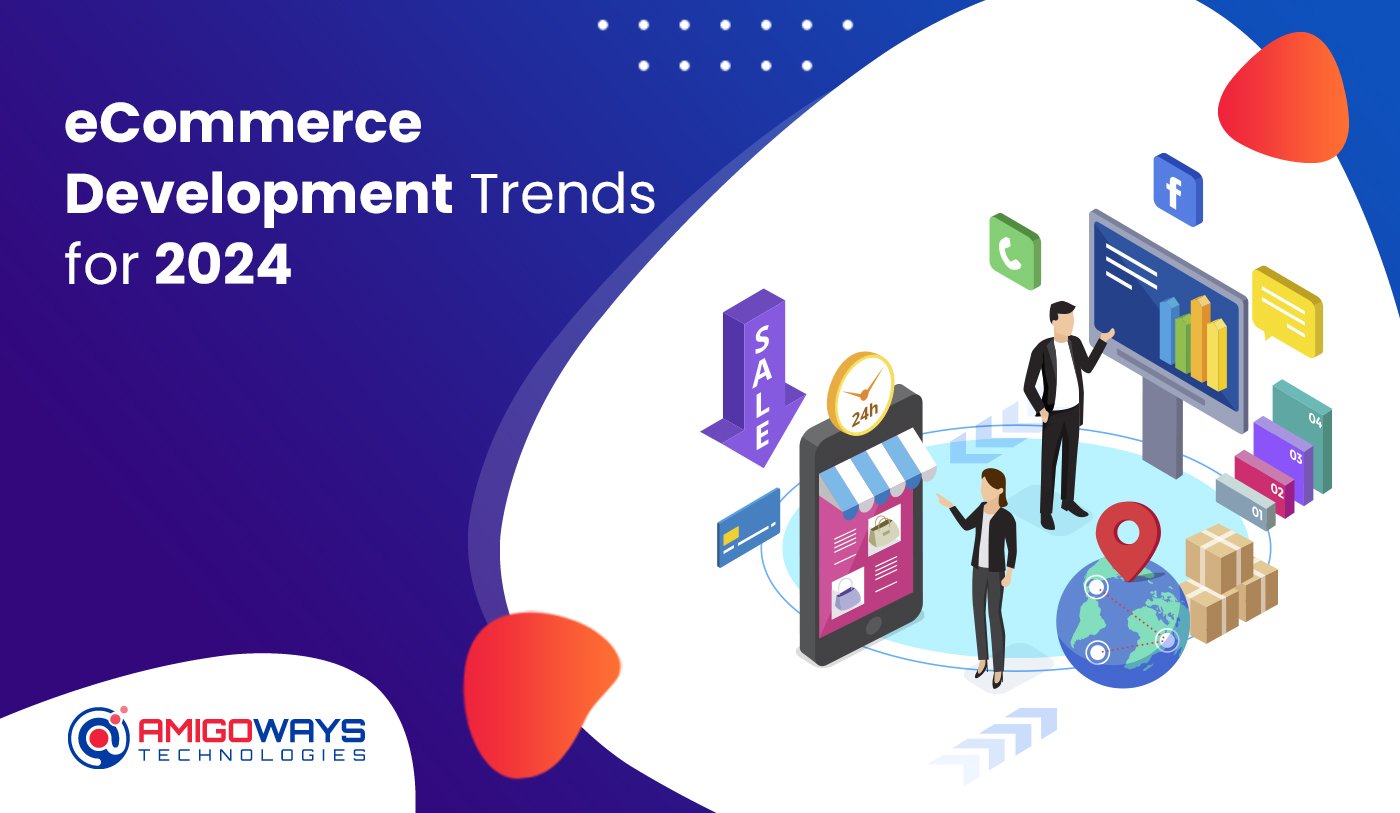Discover the future of eCommerce with Amigoways! Our blog unveils key trends for 2024, providing expert insights to elevate your business. As pioneers in eCommerce development, we guide you through mastering the market and staying ahead. Join us to explore endless possibilities for your business in 2024 and beyond.
Personalization in ecommerce
In today’s competitive business landscape, it is becoming increasingly important for eCommerce businesses to provide personalized experiences to their customers. Personalization goes beyond simply addressing customers by their names; it involves tailoring the entire shopping journey to meet the unique needs and preferences of individual customers. As we look ahead to 2024, personalization will continue to be a key trend shaping the eCommerce industry. Let’s explore some emerging personalization trends that will dominate the eCommerce space in the coming years.
1. Artificial Intelligence and Machine Learning
Artificial Intelligence (AI) and Machine Learning (ML) technologies are revolutionizing the way e-commerce businesses understand and engage with their customers. These technologies enable the collection and analysis of vast amounts of data to identify patterns and trends, allowing businesses to deliver personalized product recommendations, tailored marketing messages, and targeted promotions. AI-powered chatbots and virtual shopping assistants will also become more sophisticated, providing personalized customer support and recommendations based on individual preferences.
2. Omnichannel Personalization
Today’s consumers expect a seamless shopping experience across multiple devices and channels. In 2024, eCommerce businesses will need to go beyond traditional personalization strategies and create unified customer experiences across various touchpoints, including websites, mobile apps, social media platforms, and physical stores. Personalization algorithms will consider customer behavior and preferences across channels to deliver consistent and tailored experiences regardless of the device or platform used.
3. Dynamic Pricing Based on Customer Preferences
Dynamic pricing, driven by AI algorithms, is already prevalent in the eCommerce industry. However, in the coming years, dynamic pricing will become more refined, taking into account individual customer preferences and purchasing behaviors. Advanced machine learning models will enable businesses to optimize prices for different customer segments, maximizing revenue and customer satisfaction simultaneously.
4. Voice Commerce
Voice assistants, such as Amazon’s Alexa and Google Assistant, are gaining popularity among consumers. Voice commerce, the process of purchasing products through voice commands, is expected to become more prevalent shortly. eCommerce businesses will need to optimize their platforms for voice search and leverage AI technology to understand and respond to customer voice queries accurately. Personalized recommendations through voice assistants will soon be a regular part of the shopping experience.
5. Augmented Reality (AR) and Virtual Reality (VR)
Augmented Reality (AR) and Virtual Reality (VR) technologies have the potential to transform the online shopping experience dramatically. AR allows customers to visualize products in real-life settings, enhancing their confidence in purchasing decisions. VR enables virtual shopping experiences, immersing customers in digital environments where they can interact with products before buying. As these technologies mature, eCommerce businesses will incorporate them into their platforms to deliver highly personalized and engaging experiences.
Future of online shopping
Online shopping has already revolutionized the retail industry, but the future holds even more exciting developments. As technology continues to advance and consumer expectations evolve, eCommerce businesses must stay ahead of the curve to remain competitive. Let’s explore some key trends and innovations that will shape the future of online shopping.
1. Mobile Commerce
Mobile commerce, or m-commerce, has experienced significant growth in recent years. As smartphones become more powerful and internet connectivity continues to improve, consumers are increasingly using their mobile devices for online shopping. In the coming years, businesses must prioritize mobile optimization, ensuring that their websites and apps are fully responsive and provide an excellent user experience on all screen sizes. Additionally, integrating mobile payment options like digital wallets will become essential to cater to the growing number of mobile shoppers. When you hire a professional for eCommerce website development, they get it done for you.
2. Social Commerce
Social media platforms have evolved from mere communication channels to powerful tools for eCommerce businesses. With features like shoppable posts and integrated buy buttons, social media platforms offer a seamless shopping experience within the social environment. In the future, social commerce will continue to grow, with businesses leveraging social media data to personalize product recommendations and target advertisements more effectively. Influencer marketing will also play a vital role in driving sales and building brand loyalty within social commerce.
3. Cryptocurrency and Blockchain
Cryptocurrencies, such as Bitcoin, and blockchain technology are gaining traction in the eCommerce industry. These technologies offer secure and decentralized payment solutions, reducing transaction costs and eliminating intermediaries. As cryptocurrencies become more widely accepted, eCommerce businesses may need to incorporate them as alternative payment options to cater to tech-savvy customers. Blockchain technology can also enhance supply chain transparency and product authenticity, allowing shoppers to verify the origins and quality of products they purchase online.
4. Data Privacy and Security
With the increasing frequency and severity of data breaches, consumers are becoming more conscious of their privacy and the security of their personal information. In response, eCommerce businesses must prioritize data security measures and transparency in handling customer data. Implementing robust encryption methods, adopting two-factor authentication, and complying with privacy regulations will be essential to building trust and maintaining a loyal customer base.
5. Drone Deliveries and Autonomous Vehicles
The future of online shopping involves faster and more efficient delivery methods. Drone deliveries and autonomous vehicles are being explored as alternatives to traditional shipping methods. These technologies have the potential to significantly reduce delivery times and costs, making online shopping even more convenient for consumers. eCommerce businesses that invest in drone delivery infrastructure and autonomous vehicle fleets will have a competitive edge in the market.
Conclusion
Personalization will continue to be a driving force in eCommerce development in the coming years. Businesses that embrace emerging technologies and trends will thrive in the highly competitive online retail landscape. By leveraging artificial intelligence, optimizing for mobile and voice commerce, and providing personalized experiences across various channels, Amigoways can help your eCommerce businesses stay ahead of the curve and deliver exceptional shopping experiences to their customers in 2024 and beyond.





